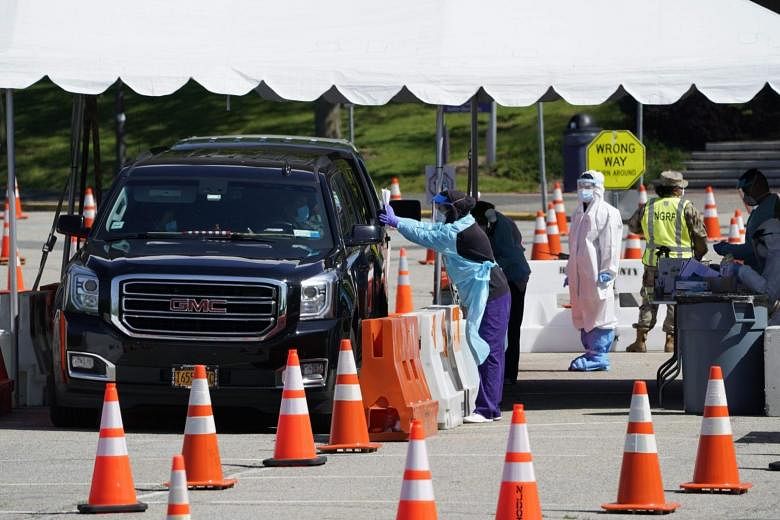WASHINGTON - Massachusetts, the first state in America to launch a statewide coronavirus contact tracing programme, quickly ran into a problem: conditioned by years of spam calls not to accept calls from unknown numbers, people are not answering their phones.
About half the 10,000 calls a day made by the team of 1,600 contact tracers go unanswered, said operations director John Welch of Partners in Health at a briefing last week.
The non-profit healthcare organisation is partnering with Massachusetts in the contact tracing effort.
Officials have since worked with telcos to ensure that calls they make will be identified as coming from the "MA COVID Team", but the hiccup underscores the logistical challenges of America's reliance on an army of human contact tracers.
Experts have touted the ability to trace the contacts of Covid-19 patients and warn them of their exposure, along with readily available tests and isolating the sick, as key to safely reopening America's coronavirus-closed economy.
But while tech giants are racing to develop and roll out apps to facilitate contact tracing, the American public and privacy advocates remain wary of them and are turning to people to manually contact trace instead, a time-consuming task and uphill battle.
In a report last month, health security experts from the Johns Hopkins University (JHU) and the Association of State and Territorial Health Officials concluded that the US would find it difficult to use the technology-heavy contact tracing methods of Singapore, South Korea and Taiwan due to privacy protections.
"The US won't be able to replicate a contact tracing effort like the one in South Korea, for example, which can use medical records, phone GPS records, credit card transactions, and closed-circuit TV," said lead report author Crystal Watson, a Johns Hopkins Centre for Health Security senior scholar.
However, the US could adopt the approaches of New Zealand and Iceland, which use traditional contact tracing measures supplemented with complementary technology, the report added.
An additional 100,000 contact tracers and some US$3.6 billion ($5.14 billion) are needed across the nation to start with, the report estimated.
"A contact tracing effort of this unprecedented scale and of this critical and historical importance to the functioning and reopening of society has never before been envisioned or required," said the report.
"Our current core public health capacity is woefully insufficient to undertake such a mammoth task."
Across the country, states are scrambling to hire and train contact tracers.
California aims to hire 20,000 contact tracers. Its first batch of 550 public employees began training this week in a programme helmed by the state's public health department and two public universities - UC San Francisco and UCLA.
New York plans to hire up to 17,000 contact tracers, who will be partially funded by Bloomberg Philanthropies and will have to undergo online training from the Johns Hopkins Bloomberg School of Public Health.
Contact tracers may encounter ethically tricky situations, according to the free JHU training course launched last week that New York tracers are required to complete.
For instance, a contact could be an undocumented worker, unwilling to quarantine because not working means not getting paid, said JHU epidemiologist and course convenor Emily Gurley.
In that scenario, tracers do not have the right to disclose that private information to anyone else, including the police and the immigration authorities, said Dr Gurley in a recorded video, adding: "The fact that she's an undocumented worker is private information, and it's irrelevant for the contact tracing effort."
Tech giants are also racing to automate the process. Google and Apple are teaming up to build apps that can use Bluetooth to track people's exposure to others with Covid-19.
While South Korea has embraced such apps, their success in other countries like Singapore has been more limited.
Singapore's TraceTogether national contact tracing app has been downloaded by 25 per cent of the population, short of the 75 per cent rate needed for its effectiveness.
Polls suggest that not enough Americans will download and use the apps for them to be successful.
Less than half, or 41 per cent, of American adults say they would take part in mobile device tracking, a Reuters Ipsos poll in late April found.
They are especially unlikely to use a cellphone-based contact tracing system established by the federal government and major tracking companies, with two-thirds of respondents saying they are not likely to do so.
A contact tracing app developed by the US Centers for Disease Control and Prevention (CDC) and public health officials scored the highest in likelihood of usage, with a bare majority of 51 per cent of respondents saying they were very or somewhat likely to use such a tool.
Currently, tech companies and public health officials are tussling over the amount of user data to reveal to the authorities, the Washington Post reported on Friday (May 15).
The software will tell users if they might have come into contact with a Covid-19 patient but will not tell health departments where those meetings happened, which officials say is of no help to state contact-tracing programmes.
Said JHU's Dr Watson: "There has to be a balance between personal privacy and getting health departments the information they need to act quickly.
"The Google and Apple partnership is promising, but it's unclear how public health officials will be able to use that information.
"I don't think we've struck that right balance yet with the technologies that are out there."












